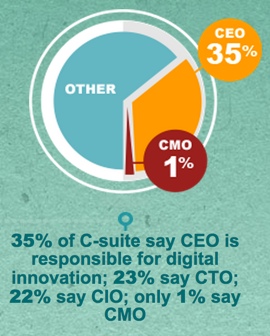Is 'marketing' ready for digital transformation?

Digital transformation will be one of the most significant drivers of business change during upcoming years. This profound trend sits at the intersection of business strategy and technology, enabled by cloud, mobile, data, and analytics.
Because business model changes lie at the heart of these transformation efforts, there are implications across the enterprise. Operations, marketing, service, IT, finance, and other departments will play a role as companies seek models that reflect changing realities in their own industries. During a recent conversation with George Westerman, an MIT researcher on digital transformation, he told me that cross-departmental silo busting is a core aspect of digital transformation.
Also see: MIT: 2014 CIO, CMO, CDO Perspectives on Digital Transformation
Although I have written extensively about the CIO's challenge during the transition to a digital world, the CMO also faces significant hurdles.

Role of the CMO. A recent study by Accenture [PDF download] explores the CMO role during this time of digital transition. According to this research, Chief Marketing Officers risk becoming marginalized because their focus looks inward toward marketing rather than more broadly at the larger domain of organizational strategy. Early on, the report questions whether CMOs have the ability to be "catalysts working across the organization."
Also read: Accenture: CIOs must embrace digital transformation
The right-hand drawing shows that the CMO is responsible for digital transformation in only one percent of organizations responding. Here is Accenture's comment:
So where is the CMO in this transformation? Barely visible. One-third of C-suite executives (35%) say the CEO is responsible for digital innovation. The chief technology officer and chief information officer follow closely at 23% and 22% respectively. The CMO, however, is at 1%.
Digital transformation and the role of marketing. Popular opinion seems to equate digital transformation with marketing, which is incorrect even if understandable. Because the marketing department controls websites, social media, and other customer-facing aspects of digital interaction, it is tempting to equate these elements with the much broader concept of digital transformation.
True digital transformation is not just a website or attractive new channel for sales or customer service. Instead, transformation involves redesigning processes, strategies, business models, and even culture to take full advantage of new capabilities offered by digital mediums and technologies. In a roadmap [PDF download] document outlining digital maturity (sponsored by Capgemini), MIT's George Westerman presents the components of digital transformation:
Going further, the following diagram, again from Westerman's paper, shows a variety of digital technologies based on the degree to which they change either customer experience or operations. As the illustration shows, many improvements to operational processes are independent of the marketing organization and CMO:
In a separate paper on the performance advantages that arise from digital transformation, Westerman illustrates distinctions and linkages between customer-facing and operational processes:
Westerman includes a diagram showing myths and realities of digital transformation. The first point emphasizes that this transformation is about more than customer experience alone:
Improving innovation and operations inside marketing are not enough. The Accenture study begins with an aspirational statement to CMOs, exhorting them to be "natural leaders" of digital transformation:
Given CMOs’ understanding of the brand and the customer, they are the natural leaders, able to envision a transformation that bridges the entire customer experience, including sales, service and product. The ability to wield, rather than be overwhelmed by, digital technologies will be critical, as will cutting across current functional boundaries. By collaborating with other C-suite executives and drawing on external partners to boost internal expertise, CMOs can become more visible change agents for digital transformation.
Although this aspirational statement is correct, Accenture’s further advice does not help CMOs with the essential next steps they need to become leaders in digital transformation. Accenture’s comment on "winning CMOs" is rooted in marketing innovation and efficiency rather than transformational business strategy and operations:
- Lead and transform the marketing role as a digital perspective transforms the enterprise.
- Embrace the full omni-channel customer experience.
- Integrate channels with real-time analytics and then act on the insights.
- Invest in agile technologies and cloud-based services.
- Re-orient the marketing operating model and integrate new talent to harness digital innovation.
Although Accenture’s research rightly argues for innovation, CMOs should understand that improving operations inside the marketing organization is not sufficient to create the credibility and relevance needed to lead digital transformation.
Genuinely transformative CMOs must figure out how to broaden their scope of concern, interest, and credibility to include strategy, process, and business model change that affects the company as a whole. Those are keys to leading digital transformation.
Also read:
Digital transformation and the high performance enterprise
Business transformation and the digital CIO
MIT CIO Symposium: Lessons on digital business transformation
Research: CIOs and the 'digitalization' of business
CxOTalk with Oliver Bussmann, CIO of UBS AG
CxOTalk with Brandon Berger, Chief Digital Officer of Ogilvy and Mather
CxOTalk with Tanya Cordrey, Chief Digital Officer of Guardian News and Media
CxOTalk with Perry Hewitt, Chief Digital Officer of Harvard University